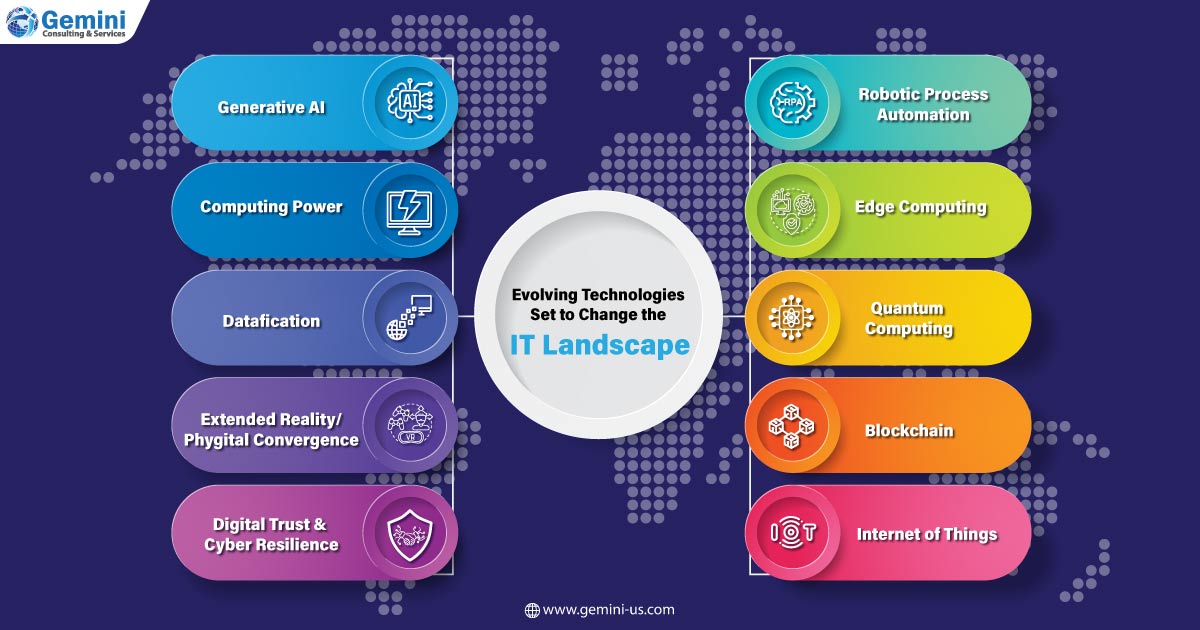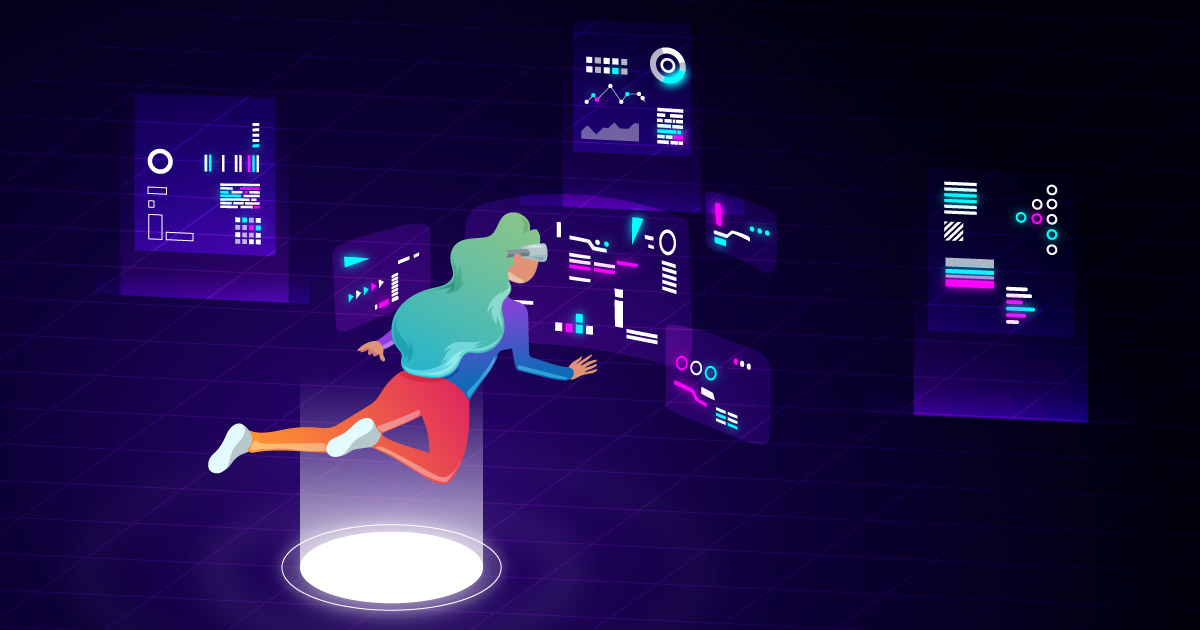As the pace of technological evolution accelerates, businesses are recognizing that their operations will undergo significant transformations in the increasingly digitalized world of tomorrow. To be successful, companies must stay abreast of emerging technologies and the latest trends, anticipating which innovations will propel their growth.
Here are the 10 technology trends expected to shape 2024, offering enterprises opportunities to align with their specific needs. By strategically combining these trends, organizations can tailor their approach to align with their strategies and transformation goals.
Positive outcomes stemming from these trends encompass improving resilience, optimizing the value derived from data, attracting and retaining top-tier talent, fostering growth, and expediting the journey towards a more digitized business landscape.
At Gemini Consulting & Services, we specialize in helping enterprises discern meaningful signals from the noise, facilitating the integration of evolving technologies as tools for revolutionary business transformations. Contact us to discover how these technologies can be leveraged to enhance your bottom line.

- Generative AI
The advent of generative AI has sparked a transformative wave across various industries, empowering machines to produce content resembling human-generated work. Its applications span diverse domains, including text generation, image synthesis, and music composition. As generative AI, such as ChatGPT by OpenAI and Copilot for Microsoft 365 becomes increasingly integrated into everyday applications, its potential is becoming more apparent. When utilized effectively, generative AI acts as a super-smart personal assistant, enhancing efficiency, speed, and overall productivity.
According to Gartner, it is projected that by 2026, over 80% of enterprises will have utilized generative AI Application Programming Interfaces (APIs) or models, or deployed GenAI-enabled applications in production environments. Importantly, entrusting routine cognitive tasks to AIs, such as obtaining information, scheduling, compliance management, and project organization, frees up human time for more creative endeavors, exploration of new ideas, original thinking, and meaningful human interactions.
- Computing Power
Computing power is the determining factor of success in the digital era as every device and appliance becomes computerized. Predictions from data science experts suggest that the current computing infrastructure will undergo further evolution in the coming years. This evolution is expected to fuel employment growth across various sectors, including data science, robotics, and IT management. The increasing demand for computing in our devices will give rise to more opportunities for technicians, IT teams, relationship managers, and customer care professionals.
- Datafication
Datafication involves the transformation of every aspect of our lives into devices or software powered by data. It is essentially the conversion of human tasks and chores into data-driven technology. From smartphones and industrial machines to office applications and AI-powered appliances, data has become an integral part of our daily existence. Safely and securely managing and storing data has emerged as a sought-after specialization in our economy.
- Extended Reality/Phygital Convergence
Extended reality encompasses technologies such as Virtual Reality (VR), Augmented Reality (AR), and Mixed Reality (MR), blurring the lines between the physical and digital realms. These technologies facilitate collaboration, gaming, and the creation of virtual spaces. The concept of the digital twin, a virtual representation of real-world objects or systems, is also gaining prominence across industries. The increasing integration of the digital and real worlds results in a more realistic human experience and a real world that is as flexible and malleable as the digital.
- Digital Trust & Cyber Resilience
As people increasingly engage with devices and technologies, digital trust has become a vital trend in fostering innovation. This trust is crucial for creating a secure and reliable digital world where companies can innovate without jeopardizing public confidence. Research indicates that one in two businesses has fallen victim to a successful cyberattack in the past three years, with the expected cost of these attacks exceeding $10 trillion by the end of 2024.
Cyber resilience goes beyond cybersecurity, encompassing measures for recovery and ensuring continuity in the face of breaches or unforeseen circumstances. This includes remote working procedures, automation of cyber defence through AI and Machine Learning (ML), integrated frameworks merging security measures with continuity protocols, and awareness of societal factors from social engineering attacks to Public Relations (PR) firefighting. These elements are essential components of any comprehensive cyber resilience strategy.
- Robotic Process Automation (RPA)
Similar to AI/ML, Robotic Process Automation (RPA) is a technology that streamlines tasks through automation. RPA employs software to automate various business processes, including interpreting applications, processing transactions, handling data, and even responding to emails. It focuses on automating repetitive tasks that were traditionally performed by humans. Interestingly, RPA not only automates existing jobs but also contributes to the creation of new roles. McKinsey’s research indicates that less than 5% of occupations can be entirely automated, while around 60% can be partially automated.

- Edge Computing
While cloud computing has become mainstream with major players like AWS, Microsoft Azure, and Google Cloud Platform dominating the market, edge computing has emerged as the next significant trend. As organizations grapple with increasing data volumes, the limitations of cloud computing in certain scenarios have become evident. Edge computing addresses these challenges by bypassing the latency associated with cloud computing, processing data closer to where it is needed. This approach allows for the processing of time-sensitive data in remote locations with limited or no connectivity to centralized data centers, effectively serving as mini data centers.
- Quantum Computing
Quantum computers leverage principles from quantum physics, such as quantum entanglement and superposition, to perform vast numbers of calculations simultaneously. Beyond its applications in preventing the spread of diseases like COVID-19, and developing vaccines, quantum computing is making inroads in sectors like banking and finance. It proves beneficial for managing credit risk, high-frequency trading, and fraud detection.
- Blockchain
While commonly associated with cryptocurrencies like Bitcoin, blockchain technology provides security in various contexts. Essentially, blockchain is a tamper-resistant chain of data, where information can only be added and not altered or removed. This immutable and consensus-driven nature ensures security, eliminating the need for a trusted third party to oversee or validate transactions. Blockchain is finding applications across diverse industries.
- Internet of Things (IoT)
The Internet of Things (IoT) connects devices, home appliances, cars, and more to the Internet and each other. This connectivity allows for remote control and data exchange. Consumers can remotely lock doors, pre-heat ovens, and monitor fitness using devices like Fitbits. IoT offers benefits such as enhanced safety, efficiency, and decision-making for businesses through data collection and analysis. It enables predictive maintenance, accelerates medical care, improves customer service, and holds the potential for unforeseen benefits.



